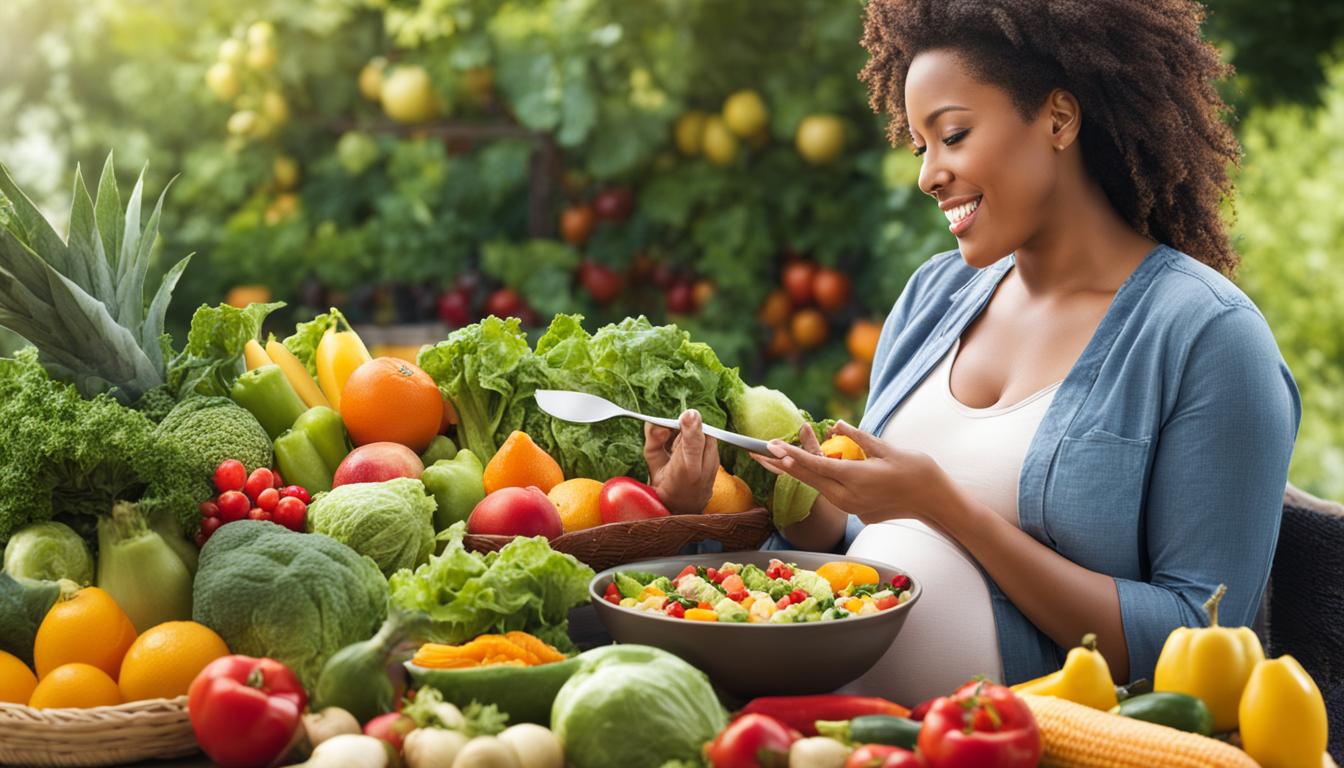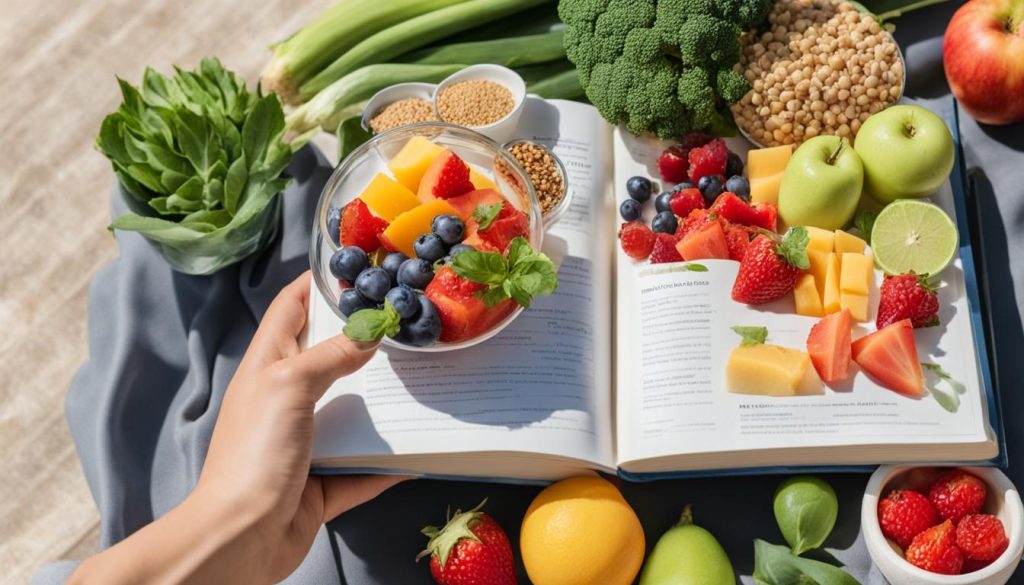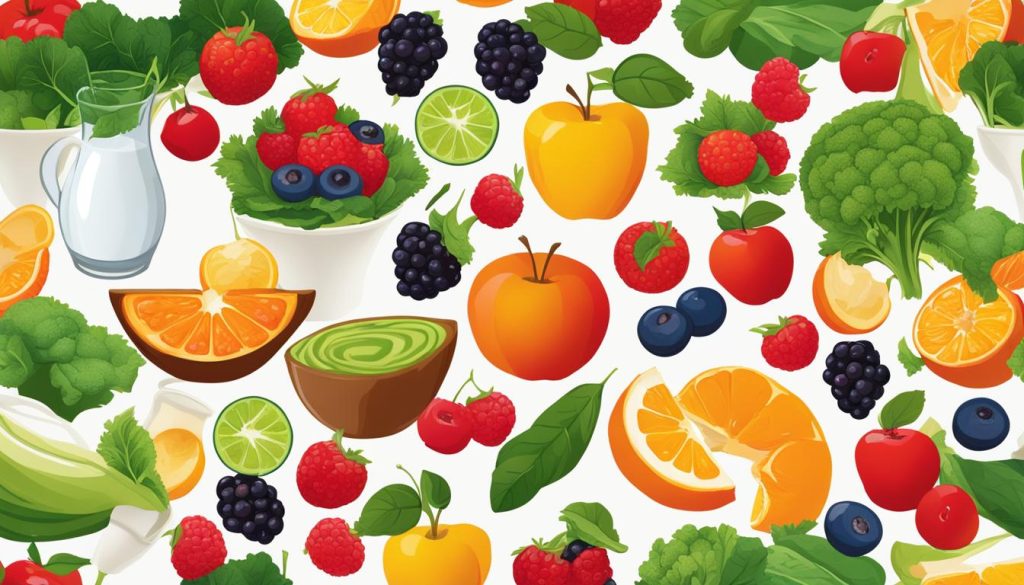Can You Diet During Pregnancy?

Dieting during pregnancy is a topic that raises many questions and concerns among expectant mothers. While it is important to maintain a healthy weight and eat a balanced diet during pregnancy, strict dieting or weight loss attempts are generally not recommended.
A healthy eating plan during pregnancy should focus on nourishing both the mother and the growing baby, providing essential nutrients for their development. In this article, we will explore the importance of a balanced diet during pregnancy and provide insights into healthy eating habits for expectant mothers.
Key Takeaways:
- Strict dieting or weight loss attempts are generally not recommended during pregnancy.
- A balanced diet is crucial for the proper growth and development of both the mother and the baby.
- Focus on nourishing the body with essential nutrients rather than restricting food intake.
- Consult with healthcare providers for personalized guidance on maintaining a healthy diet during pregnancy.
- Listen to your body's cues and cravings, and make healthy food choices that support your well-being.
Understanding the Necessity of a Balanced Diet in Pregnancy
A balanced diet is crucial during pregnancy to ensure the proper growth and development of both the mother and baby. It provides the necessary nutrients for their overall health and well-being. Let's explore the importance of a balanced diet during this special time and the role it plays in supporting the needs of expectant mothers and their babies.
The Role of Diverse Nutrients for Mother and Baby
During pregnancy, the body has increased nutrient needs to support the development of the baby and to maintain the mother's own health. A balanced diet ensures that expectant mothers receive the necessary vitamins, minerals, and other essential nutrients to promote a healthy pregnancy. These nutrients play a vital role in the formation of the baby's organs and tissues, as well as in supporting the mother's immune system and overall well-being.
There's no need to "eat for 2"
Contrary to popular belief, pregnancy does not require "eating for two." While it is true that additional calories are needed during pregnancy, the increase is not as significant as commonly thought. Pregnant women typically require only around 300-500 extra calories per day to meet their increased energy needs. It is important to focus on the quality of these calories rather than consuming excessive amounts of food.
Recommended Daily Intake of Key Vitamins and Minerals
Pregnant women should pay attention to the recommended daily intake of key vitamins and minerals. These include folic acid, iron, calcium, and omega-3 fatty acids, among others. These nutrients are essential for the healthy development of the baby and for supporting the mother's health during pregnancy. Consulting with healthcare providers to determine the individualized daily intake requirements is crucial for meeting these nutritional needs.
Healthy Dietary Changes vs. Restrictive Dieting
When it comes to dieting during pregnancy, healthy changes to one's eating habits are recommended over restrictive dieting practices. It is important to focus on consuming a variety of nutritious foods, including plenty of fruits, vegetables, whole grains, lean proteins, and healthy fats. Making gradual, sustainable changes to improve the overall quality of the diet can contribute to a healthier pregnancy journey. Restrictive diets can deprive the body of essential nutrients and may not provide adequate nourishment for both the mother and baby.
A balanced diet during pregnancy is vital for the well-being of both the mother and baby. By understanding the importance of diverse nutrients, avoiding the misconception of "eating for two," following the recommended daily intake of key vitamins and minerals, and making healthy dietary changes, expectant mothers can support a healthy pregnancy and lay the foundation for their baby's optimal growth and development.
Maintaining a Healthy Relationship with Food During Pregnancy
Pregnancy is a transformative period that brings about changes in both our bodies and our emotions. It is an important time to prioritize our well-being and establish a healthy relationship with food. By nourishing our bodies with a balanced diet, we can support our physical and mental health during this remarkable journey.
Psychological Impacts of Dieting
Dieting during pregnancy can have significant psychological impacts on expectant mothers. The pressure to meet certain weight standards or restrictive eating patterns can lead to feelings of guilt, anxiety, and a negative body image. It is important to remember that pregnancy is not a time to focus on weight loss or restrictive dieting, but rather on nourishing ourselves and our growing babies.

Navigating Cravings and Healthy Snacking
During pregnancy, it is common to experience cravings for specific foods. These cravings can be attributed to hormonal changes and our body's increased need for certain nutrients. Instead of ignoring or suppressing these cravings, it is important to listen to our bodies and find healthy ways to fulfill them.
One way to handle cravings is by incorporating a variety of nutrient-dense foods into our diet. This ensures that we are meeting our nutritional needs while still enjoying the foods we crave. For example, if you are craving something sweet, opt for fresh fruits or yogurt instead of sugary snacks.
Healthy snacking plays a crucial role in maintaining energy levels and sustaining a healthy weight during pregnancy. Instead of reaching for processed snacks, choose nutritious options such as nuts, seeds, and vegetables with hummus. These snacks provide essential nutrients and help keep cravings in check.
Furthermore, practicing mindfulness and self-care can contribute to a healthy relationship with food during pregnancy. Engaging in relaxation techniques, such as deep breathing or gentle exercise, can help manage stress and prevent emotional eating. Additionally, seeking support from loved ones or joining a pregnancy support group can provide a sense of community and encouragement on this journey.
Remember, maintaining a healthy relationship with food is about nourishing your body and prioritizing your well-being. By listening to your body's needs, managing cravings with healthy choices, and practicing self-care, you can support a healthy and joyful pregnancy.
Essential Nutrients and Their Sources for Pregnant Women
Meeting the nutritional needs of a pregnant woman is crucial for the healthy development of the baby. During pregnancy, there are several essential nutrients that play a vital role in supporting maternal and fetal health. These nutrients include protein, calcium, iron, and folic acid.
Protein is essential for the growth and repair of tissues in both the mother and the baby. Good sources of protein for pregnant women include lean meats, poultry, fish, eggs, dairy products, legumes, and tofu.

Calcium is necessary for the development of strong bones and teeth in the baby. It also helps regulate muscle contractions and supports the proper functioning of the nerves and heart. Dairy products such as milk, cheese, and yogurt are rich sources of calcium. Leafy green vegetables, fortified plant-based milks, and calcium-fortified foods are suitable alternatives for those who cannot consume dairy.
Iron is crucial for the production of red blood cells, which carry oxygen to the baby. Pregnant women need more iron to support the increased blood volume and the growing needs of the developing baby. Good sources of iron include lean meats, poultry, fish, fortified cereals, tofu, spinach, and beans.
Folic acid, also known as folate, is an essential nutrient for preventing certain birth defects of the baby's brain and spine. It is recommended that women of childbearing age, including pregnant women, consume at least 400 micrograms of folic acid daily. Good sources of folic acid include leafy green vegetables, citrus fruits, beans, fortified cereals, and supplements.
Incorporating these essential nutrients into a balanced diet is crucial for the overall health and well-being of both mother and baby throughout pregnancy. By consuming a variety of nutrient-rich foods, pregnant women can ensure they are providing their bodies with the necessary building blocks for a healthy pregnancy journey.
Common Myths About Pregnancy Eating Habits
Pregnancy is a time filled with excitement, anticipation, and unfortunately, a lot of misinformation. There are many myths and misconceptions surrounding pregnancy eating habits that can confuse expectant mothers and hinder their ability to make informed choices. In this section, we will debunk some of the most common myths about pregnancy eating habits and provide evidence-based information to help you navigate your dietary needs during pregnancy.
One of the most prevalent myths is the belief that you need to eat for two during pregnancy. While it is true that your body requires additional nutrients during this time, it does not mean you need to consume double the amount of food. In fact, consuming excessive amounts of calories can lead to excessive weight gain, which can increase the risk of gestational diabetes and other complications.

Another myth is the notion that pregnant women should avoid certain types of foods. While it is important to avoid foods that pose a risk of foodborne illnesses, such as raw seafood and unpasteurized dairy products, there is a misconception that a long list of foods needs to be completely eliminated. In reality, most foods can be safely consumed in moderation, as long as they are prepared and cooked properly.
It's important to remember that every pregnancy is unique, and your dietary needs may vary. Rather than relying on myths and hearsay, it's essential to seek evidence-based information from reliable sources and consult with your healthcare provider. They can provide personalized guidance and help you make informed decisions about your pregnancy eating habits.
Dieting During Pregnancy: Safe or Not?
Expert Advice on Weight Management for Expectant Mothers
When it comes to dieting during pregnancy, expectant mothers often wonder whether it is safe and beneficial for their health and the health of their baby. It is important to understand the expert advice on weight management during pregnancy to make informed decisions.
Managing weight gain and maintaining a healthy weight are key considerations during pregnancy. However, strict dieting or attempting to lose weight while pregnant can pose risks. Expert healthcare providers recommend a balanced approach to weight management and emphasize the importance of consulting with them for personalized guidance.

Risks Associated with Dieting While Pregnant
Dieting during pregnancy without proper guidance can have potential risks. Restrictive eating patterns may result in insufficient intake of essential nutrients needed for the healthy development of the baby. This can lead to nutritional deficiencies and impact both the mother's and the baby's well-being.
Additionally, excessive weight loss during pregnancy can impair fetal growth and increase the risk of complications such as premature birth or low birth weight. It is crucial to prioritize the health and well-being of both the mother and the baby throughout the pregnancy journey.
Conclusion
In conclusion, maintaining a balanced diet and a healthy relationship with food are essential for a healthy pregnancy. As an expectant mother, it is important to prioritize your well-being and the development of your baby by making conscious choices about what you eat.
Key Takeaways for a Healthy Pregnancy Journey
First and foremost, remember that a balanced diet during pregnancy is crucial. Make sure to include a variety of nutrients by consuming a mix of fruits, vegetables, whole grains, lean proteins, and dairy products. This will help ensure that you and your baby receive the necessary vitamins, minerals, and other essential nutrients for a healthy pregnancy.
Secondly, listen to your body. Pay attention to hunger and fullness cues, and eat when you are hungry. Give yourself permission to indulge in occasional cravings while also aiming to make nutritious choices. Remember, it's about finding a balance between enjoying your food and nourishing your body.
Consulting Healthcare Providers for Personalized Guidance
Lastly, it is crucial to seek personalized guidance from healthcare providers throughout your pregnancy journey. They can provide tailored advice based on your individual needs and medical history. Regular check-ups with your obstetrician or midwife will ensure that you are on track and address any concerns or questions you may have.
Remember, every pregnancy is unique. By maintaining a balanced diet, listening to your body, and seeking professional guidance, you are taking proactive steps towards a healthy pregnancy for both you and your baby.